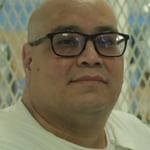
Charles Flores (pictured) was convicted and sentenced to death in 1999 for the 1998 robbery and murder of Elizabeth “Betty” Black in her Texas home. Mr. Flores was convicted because of the testimony of Jill Barganier, the victim’s neighbor, who only identified Mr. Flores after being hypnotized by police. No DNA or physical evidence connects Mr. Flores to the crime. Attorneys for Mr. Flores argue that he should be granted a new trial because of changes in the understanding of witness testimony and changes in law regarding the use of hypnotized testimony since 1999. According to memory experts, investigative hypnosis lacks proven effectiveness for improving an individual’s recall ability and may create false memories in crime victims and witnesses.
At the time of the crime, Ms. Barganier told the police she recognized one of the two men as Richard Childs, who Ms. Black knew. However, she was unable to identify the second individual, even after being shown images of Mr. Flores. After the initial interview, Ms. Barganier was again questioned and this time police used hypnosis in an attempt to help her recall more details. Under hypnosis, she repeated her initial description of the second individual as white, slim and long-haired, even when asked by police if the person had a clean-shaven head.
Mr. Flores did not match this description. Mr. Flores is Hispanic, short, stocky, shaved his head, and wore glasses — contradictory to each of the identifying factors brought to law enforcement’s attention. But at the trial 13 months later, after admitting to seeing Mr. Flores’ image on the news, Ms. Barganier testified that Mr. Flores was indeed the second individual she saw at Ms. Black’s home on the day of the crime.
“[E]ven though Texas law no longer allows criminal convictions based on testimony obtained from ‘hypnotized’ witnesses, the Texas Attorney General is endeavoring to push a trial court to set an execution date for Flores, whose wrongful conviction in Dallas County inspired the change in Texas law.”
In 2020, a Dallas Morning News investigation examined the use of investigative hypnosis in Texas. State Senator Juan “Chuy” Hinojosa explained to The News that “experts in forensic psychology have for years raised concerns that hypnosis does not work as a memory-recovery method and it does not increase the accuracy of eyewitness recall and recognition.” By 2020, criminal trials in approximately half of the U.S. prohibited or strongly limited “hypnotically-induced testimony” because of concerns with wrongful convictions. The News reported that since the 1980s, the Texas Department of Public Safety used investigative hypnosis in criminal investigations at least 1,700 times, leading to prison sentences for dozens and death sentences for others. Experts identified for The News four concerns with the use of hypnosis by Texas law enforcement in criminal investigations: suggestibility affects subjects, critical-thinking abilities may diminish, “confabulation” occurs when subjects fill memory gaps with fictional events, fabricated memories can solidify through “memory cementation” over time. In response to The News’ reporting, the Texas Rangers ceased using hypnosis in investigations and lawmakers passed legislation in 2023 that ultimately bans the use of hypnosis-based testimony in criminal proceedings.
University of California San Diego Psychology Professor John Wixted, whose research on eyewitness testimony is referenced in this case, told KERA News in April 2024 that Ms. Barganier’s initial failure to identify Mr. Flores is indicative of his innocence. “We’re not just impeaching the witness’ testimony,” he said. “We’re talking about new, substantive evidence of innocence that was never considered by anybody, and now he’s out of appeals and heading for execution.”
Mr. Flores has exhausted his appeals and Texas Attorney General Ken Paxton is seeking a warrant for his execution. According to counsel for Mr. Flores’, the new filings also stress that the Texas Attorney General’s Office is “improperly seeking an execution date even though that office has no legal authority to do so.” According to Ms. Sween, seeking an execution date for a prisoner in Texas is the responsibility of the local district attorney, who has not asked for one in this case.
Richard Childs, whom Ms. Barganier also identified at the initial trial, struck a deal with prosecutors, confessed to killing Ms. Black and was sentenced to 35 years in prison. He was released after serving about 17 years of his sentence.
Robin Bradshaw, Texas death row conviction challenged over use of ‘hypnotized’ testimony, Beaumont Enterprise, May 14, 2025; Kirk Semple and Adam Westbrook, Junk Science Put Me on Death Row. I Shouldn’t Die., The New York Times, August 12, 2024; Toluwani Osibamowo, Recent research on eyewitness memory may be Texas death row inmate’s last hope, KERA News, April 24, 2024; Lauren McGaughy, Texas bans testimony based on police ‘investigative hypnosis’ in criminal trials, The Dallas Morning News, June 30, 2023; Jolie McCullough, Texas Court Halts Execution in Dallas Murder, Texas Tribune, May 27, 2016.



